Surry County Probate Records
In 1652, Surry County was formed from a portion of James City County in the Royal Colony of Virginia south of the James River. In 1676, a local Jacobean brick house was occupied as a fort or castle during Bacon’s famous Rebellion against the Royal Governor, Sir William Berkeley.
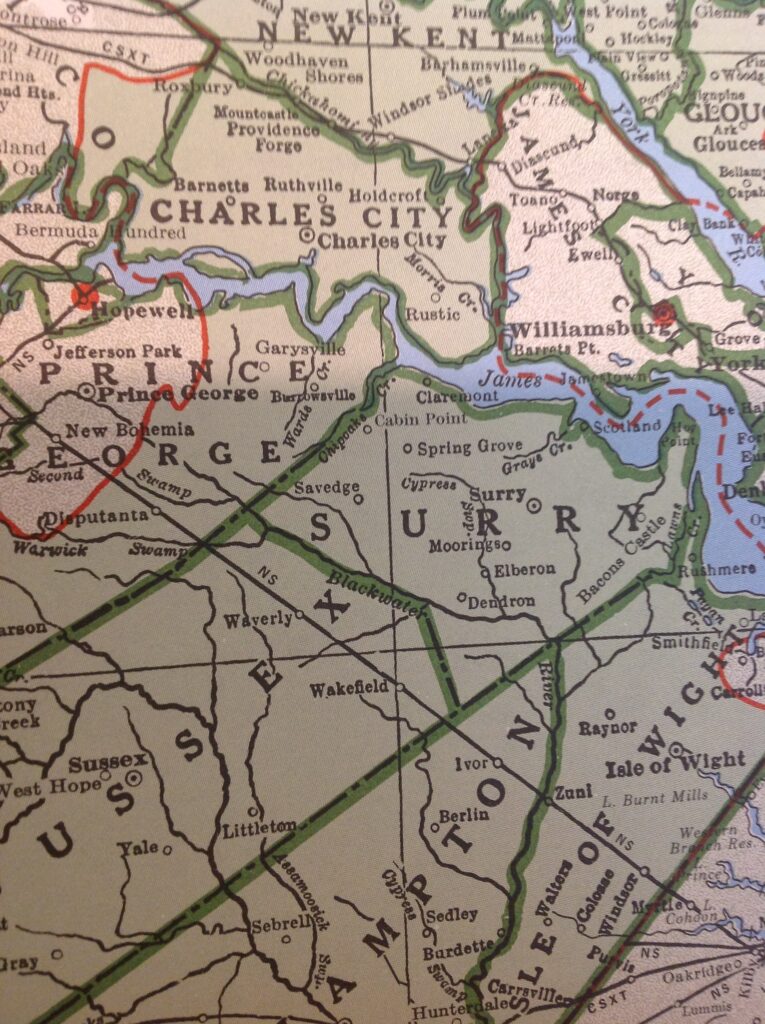
Surry County Guardian Accts
- 1672 to 1750
- 1744 to 1762
- 1762 to 1783
- 1783 to 1803
- 1804 to 1820
- 1821 to 1831
Unrecorded Wills
- 1759 to 1844
Miscellaneous Wills
- Banks, John, LWT (extract of lost records)
- Gording, John, LWT (extract of lost records)
- Harrison, Benjamin, LWT (transcript)
- Taylor, Thomas, LWT dated 1744
- Warren, Willis, LWT (extract of lost records)
- Watkins, Martha, LWT (extract of lost records)
Tithables
Note: All males 16 years and over had to declare themselves annually and the number of males which they brought into the colony (mostly white indentured, but some African-American).
- 1652-1672
- 1671-1684
- 1679
- 1680
- 1681
- 1682
- 1683
- 1684
- 1685
- 1686
- 1687
- 1688
- 1689
- 1690
- 1691
- 1694
- 1695
- 1696
- 1697
- 1699
- 1700
- 1701
- 1702
Military
- Militia Fines 1800, 1801, 1802, 1821
Indexes to Wills and Deeds
- Wills and Deeds 1652 to 1672
- Wills and Deeds 1671 to 1684
- Wills and Deeds 1684 to 1687
- Wills and Deeds 1687 to 1694
- Wills and Deeds 1694 to 1709
- Wills and Deeds 1709 to 1715
- Deeds 1741 to 1746
- Deeds 1746 to 1749
Maps
- Old Map
Marriage Records
- Marriages to 1699
- Marriage Index 1768 to 1853
- Marriage Register 1768 to 1853
- Marriages 1772 to 1825
Miscellaneous
- 1704 Quit Rent Rolls
Traced genealogies and family histories of Surry County available to Members !
- Dunn
- Heath
- Rogers
- Taylor
Images of Wills and Estates 1652-1672
Note: Incomplete due to damaged images
- Blackbone, Joseph
- Booz, J.
- Broad, George
- Foreman, Thomas
- Hall, William
- Jones, Ralph
- Lurus, T.
- Mason, James
- Shepherd, Joseph
- Washope, Joseph
- Wynne, John
Images of Wills and Estates 1671-1684
Note: Incomplete due to damaged images
- Aberson, William
- Allen, Arthur
- Anny, Charles
- Baker, Lawrence
- Barton, John
- Bopham, Charles
- Brewster, Charles
- Bridgeman, Edward
- Browne, Edward
- Cartwright, Robert
- Clay, Thomas
- Corkins, William
- Delks, Roger
- Drew, Richard
- Drew, Thomas
- Edwardson, William
- Emmerson, John
- Flood, John
- Gold, Edward
- Goring, John
- Good, Henry
- Gray, Thomas
- Grogan, John
- Grove, John
- Harte, Charles
- Haskins, Nicholas
- Hedy, John
- Hickman, Elizabeth
- Hill, Thomas
- Hoge, Hoge
- Holt, Randall
- Horderet, Thomas W.
- Hornsby, Francis
- Hornsby, James
- Howell, Edmond
- Hunt, Jasper
- Johns, Richard
- Jones, Susannah
- Kilpatrick, James
- Kindred, John
- King, Thomas
- Kinnard, Augustine, Sr.
- Knight, Nathaniel
- Leeler, Robert
- Long, Mary
- Marriott, Thomas
- Marriott, William
- Moring, John
- Parker, Judith
- Price, John
- Proctor, George
- Rawlings, John
- Richards, Lott
- Rookings,, William
- Sherwood, William
- Smith, John
- Spensor, Robert
- Watkins, Henry
- Weeks, Thomas
- White, Joun
- Williams, Robert
Images of Wills 1684-1687
Note: Incomplete due to damaged images
- Avery, Richard
- Barrow, Thomas
- Clarke, John
- Dough, Walter
- Jordan, Thomas
- Scarle, Richard
- Spenser, Robert
Images of Wills and Estates 1687-1694
Note: Incomplete due to damaged images
- Avery, George
- Avery, Richard
- Barnes, John
- Barrow, Thomas
- Briggs, Margery
- Bynham, John
- Clarke, Thomas
- Creed, William
- Dimford, John
- Due, John
- Eidway, Mary
- Forbes, James
- Forbush, James
- Francis, Henry
- Hamilton, I.
- Hansford, P.
- Haviland, Anthony
- High, Thomas
- Hyelocot, Thomas
- Jordan, Thomas
- Knisaph, John
- Marke, Richard
- Margory, William
- Matson, Job
- Middleton, George
- Newsom, William
- Nicholson, Francis
- Phillips, John
- Pottway, Edward
- Roade, William
- Rugsboo, William
- Sherrard, Dennis
- Smith, John
- Sopurns, Nicholas
- Swann, Samuel
- Taylor, John
- Taylor, Walter
- Tibbott, Richard
- Tooker, Henry
- Upchurch, Thomas
Images of Wills and Estates 1694-1709
Note: Incomplete due to damaged images
- Allen, John
- Bagley, Hugh
- Bagerhood, Thomas
- Bennet, Jonas
- Binns, Thomas
- Botter, Roger
- Bowman, Thomas
- Briggs, George E.
- Bullock, Richard
- Carr, Thomas
- Clary, Thomas
- Collins, John
- Cook, James
- Covon, Joseph
- Crows, Thomas
- Ehndseuth, Matthew
- Esoll,, Timothy
- Forbush, Theophilus
- Fort, John
- Francis, Henry
- Grantham, Edward
- Gray, John
- Gully, Luccey
- Gulley, Robert
- Hammock, John
- Haney, J. W.
- Hargrave, Richard
- Harris, John
- Harrison, Benjamin
- Howard, John
- Howson, George
- Inman, Robert
- Ironmonger, Mary
- Johnson, Martin
- Jolks, Richard
- Jordan, Anna
- Jordan, Arthus
- Jordan orphans
- Jordan, Richard
- Jordan, Samuel
- Killingsworth, William
- Lather, John
- Leward, William
- Mariott, Mathew
- Mason, Francis
- Mason, James
- Measle, Luke
- Modes, William
- Monroe, John
- Nash, William
- Newson, John
- Newsom, William
- Paleton, John
- Peyton, John
- Phillips, David
- Phillips, John
- Pickerill, William
- Pidington, Thomas
- Pottaway, William
- Rawlins, Roger
- Reynolds, Robert
- Riddick, James
- Robinson, James
- Rogers, William
- Roggers, John
- Saffield, Nicholas
- Savige, Robert
- Shally, Phillip
- Simons, Elizabeth
- Simons, William
- Swan, Matthew
- Swett, Robert
- Thompson, John
- Watkins, John
- Wood, Joseph
- Wrath, William
- Yost, Timothy
Images of Wills 1709 to 1715
Note: Incomplete due to damaged images
- Adkins, Thomas
- Allen, James
- Baily, Robert
- Barker or Burcher, John
- Bookey, Edward
- Edwards, John
- Ellis, James
- Figler, Christopher
- Harris, Elizabeth
- Harrison, Benjamin
- Hunt, William
- Mayberry, Elizabeth
- Mayberry, Francis
- Randall,, George
- Rockins, William
- Ruffin, Elizabeth
- Rustwell, John
- Witherington, Nicholas
- Wyche, Henry
Images of Wills and Estates 1715 to 1730
- Anderson, John
- Andrews, Robert
- Apple, John W.
- Balse, Robert
- Barlow, John
- Barner, Francis
- Bayley, Robert
- Bennett, Richard
- Blow, George
- Braddu, Edward
- Brantley, Hester
- Browne, John
- Callahan, Morris
- Chambers, Olive
- Chapman, Benjamin
- Clark, John
- Clarke, Henry
- Clark, Robert Sr.
- Clements, Francis
- Clemons, John
- Coker, John
- Coker, Margaret
- Collier, John
- Collier, Joseph
- Cotten, Mary
- Davis, Arthur
- Davis, Nicholas
- Dobe, John
- Edmunds, Howell
- Edwards, Benjamin
- Evans, John
- Ezell, Michael
- Farret, George
- Faulson, Isaac
- Faulson, Jacob
- Ferraby, Benjamin
- Flacke, Robert
- Ford, John
- Fox, George
- Freeman, John
- Glover, Richard
- Green, Nathaniell
- Grice, Robert
- Hagood, George
- Hall, Joseph
- Harris, John
- Harris, Joseph
- Harris, Margaret
- Hart, Richard
- Hart, Robert
- Hawthorn, John
- Heath, Adam
- Hicks, John
- Hide, Richard
- Hill, Benjamin
- Holt, John
- Howell, John
- Hunnicutt, Margaret
- Hutchins, John
- Jarrad, Nicholas
- Jarrett, Charles
- Jarrett, Ferdinando
- Jarrett, George
- Jarrett, Henry
- Johnson, Marlin
- Jones, Arthur
- Jordan, George
- Kever, John
- Kitchen, John
- Lacey, Mary
- Lather, John
- Lewis, Morgan, Lewis
- Lowerby, Francis
- Lucas, Grace
- Lukelasco, John
- Lynes, Robert
- Magarety, Patrick
- Maybury, Francis
- Merritt, Elizabeth
- Mitchell, John
- Moreland, Brockett
- Moreland, Edward
- Newell, Elizabeth
- Newson, John
- Nicholson, Ann
- Nicholson, George
- Nicholson, James
- Obourn, John
- Pack, John
- Parham, Ephraim
- Peake, John
- Peters, Joannah
- Phillips, Mary
- Pingington, Edward
- Pledge, Charles
- Pocks, Edward
- Price, Francis
- Proctor, Joshua
- Ray, Joseph
- Regan, Francis
- Reives, John
- Savidge, Charles
- Savidge, Levelis
- Scarboro, Edward
- Sessons, Nicholas
- Seward, James
- Simson, John
- Sledge, Mary
- Smith, John
- Smith, Nicholas
- Snelgrove, Henry
- Sowerby, John
- Spratley, John
- Stanton, James
- Tarret, Mary
- Taylor, Etheldred
- Taylor, Richard
- Terrell, Charles
- Tharp, John
- Tharpe, Joseph
- Thompson, Nicholas
- Tooke, John
- Walker, Humphrey
- Watkins, John
- Weak, Richard
- Weaver, John
- Weaver, Kenneth
- White, John
- White, Mary
- Williams, Charles
- Williams, Jones
- Windom, Griffin
- Wrenn, Richard
The Mule Chest
The Mule Chest is one of the earliest forms of the chest of drawers. It was made in the countryside as early as the Cromwellian era and for as long as a hundred years. In more fashionable circles it was soon developed into the well-known Jacobean chest of 55 drawers, the prototype of the form in use today. The chest pictured was dated about 1701 and did not develop into a new style for fifty years or more.
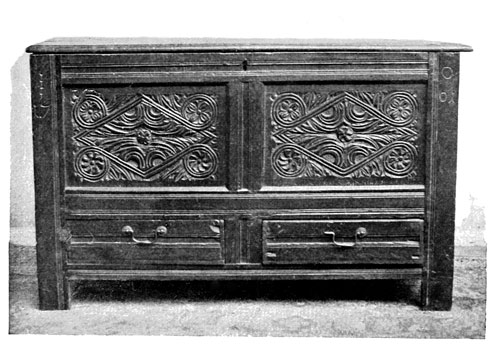
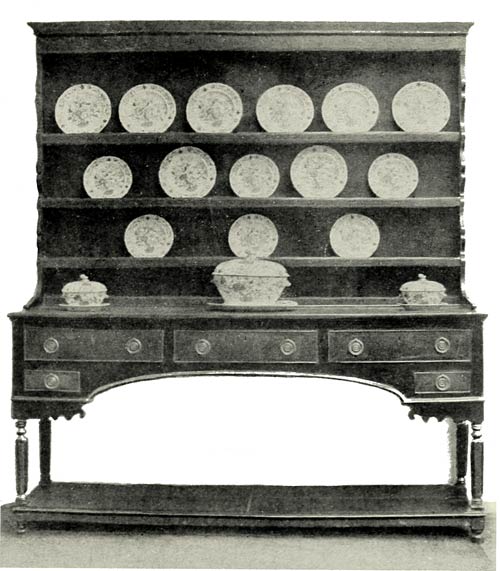
Oak Dresser
The oak dresser depicted here dates to early 18th century England. Its arched formation and serpentine outline on the sides reach more than six feet. The earliest settlers coming to Virginia with indentured servants also exported certain supplies and furniture necessary for colonial cottages. While they availed themselves of natural materials found in the countryside, such as tree lumber used to build homes and barns and the berries from myrtle bushes used to make wax candles, they soon discovered that the cost of importing nails, glass windows, and other implements was prohibitive. As barns and other buildings were dismantled, plank boards and nails were saved for future use.
17th Century Celebrations: Guns Fired over the Grave
In his last will and testament, George Jordan of Surry County expressly forbade guns to be fired over his grave and directed that his executors permit no drunkenness to disgrace the occasion. In his last will and testament, he wished a good and decent funeral. This is but one of the interesting stories the genealogist learns upon examining the estate of colonials. He obtains knowledge of the history of the area, peculiar bequests, and stories to tell family members. However, it is not enough to simply read the will, one must also study every detail of the estate proceedings, from the inventories and annual returns to receipt vouchers. Source: Surry County Records, Vol. 1671-84, p. 295. List of Traced Virginia Families on this website
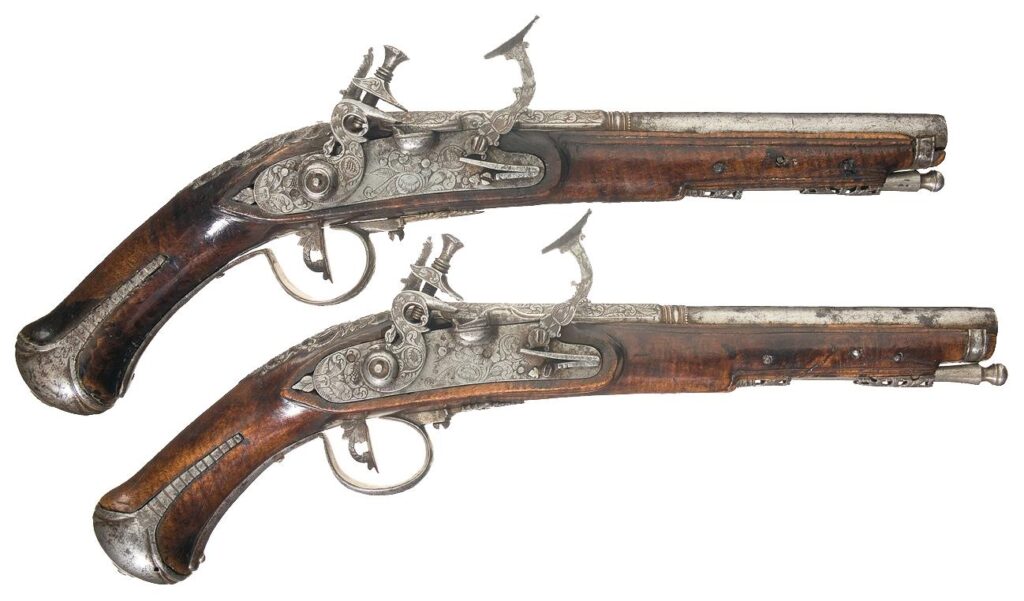
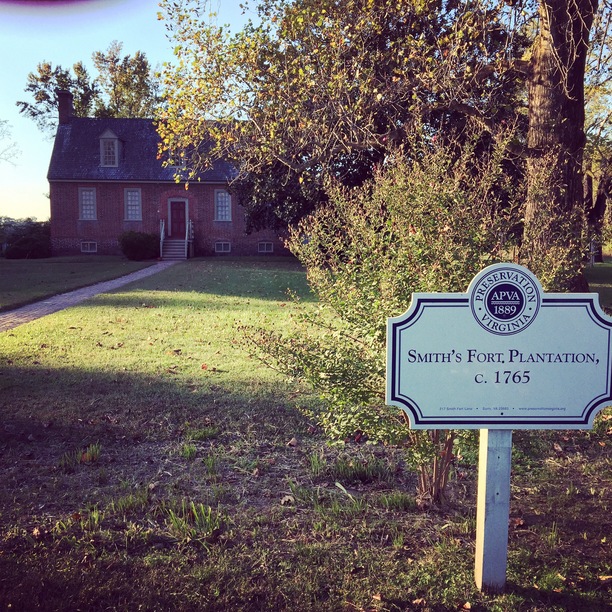
Smith's Fort
Capt. John Smith’s fort in Surry County, Virginia; also called the Rolfe-Warren House. The fort no longer exists. This area was selected for the site of a town. As an inducement to build, settlers were granted in fee simple a half-acre lot. In 1652, Surry County was formed from a portion of James City County in the Royal Colony of Virginia south of the James River. In 1676, a local Jacobean brick house was occupied as a fort or castle during Bacon’s famous Rebellion against the Royal Governor, Sir William Berkeley.
The Forgotten People
Obviously, everyone is not accounted for who crossed the Atlantic and came to the American shores of freedom. Shipwrecks were fairly common as vessels were met with storms and hurricanes and thrown off-course. Thus, those who were en route for America who never heard from by relatives abroad were forgotten. If we had the ship manifests of all of the vessels who crossed the seas, listing the names, ages, and occupations of those traveling, a plethora of information would be available to genealogists. One can get an idea of the situation by reading some of the old Wills in England which state that someone was traveling to the colonies, or elsewhere. The Jamestown settlement suffered from starvation and poverty. After more than half of the settlers were massacred by Indians in 1622, the colony was in desperate straits.
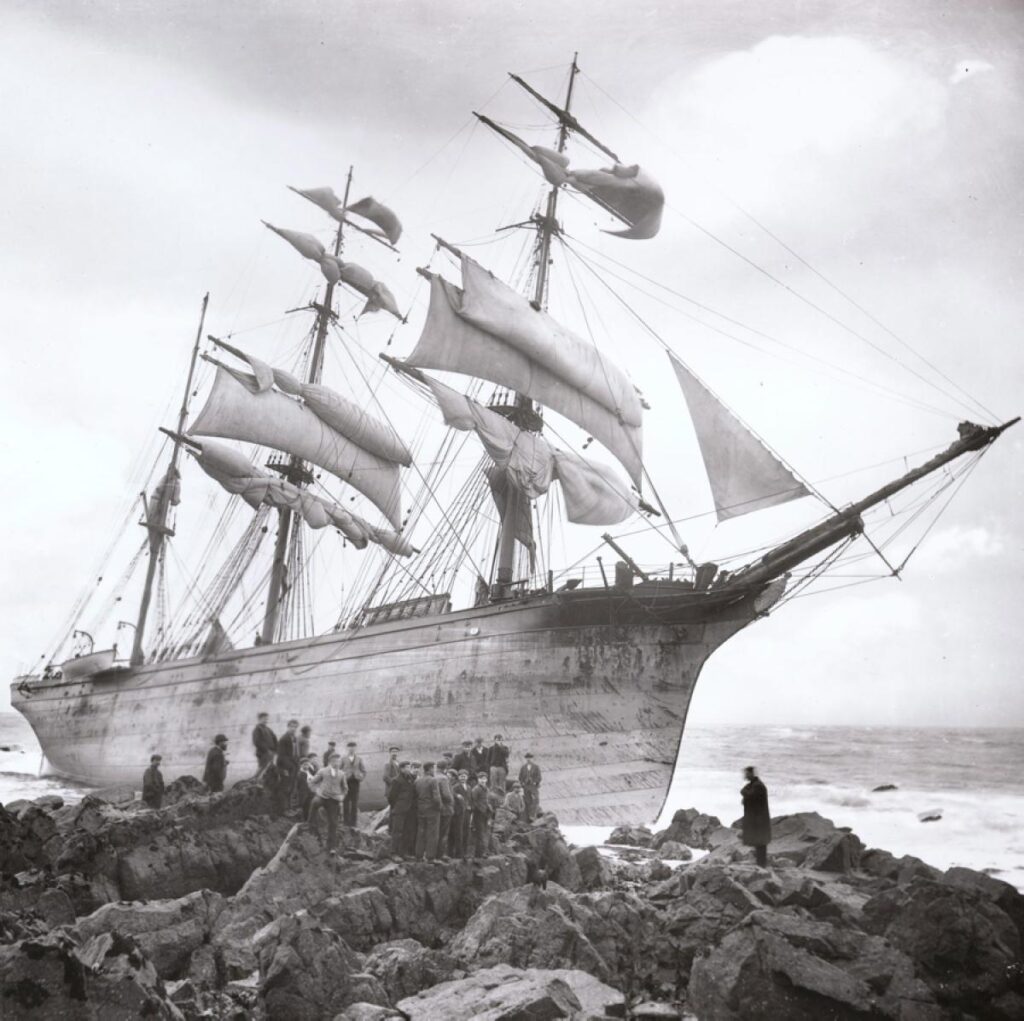
From that time going forward and as royal governors were sent to rule, colonists struggled to keep laws that did not particularly apply to a wilderness setting. During the 18th and 19th centuries, there existed heavy traffic of trade throughout the West Indies, Great Britain, and America. In fact, during the early colonization period of the 17th century, the English passed laws against the colonists trading with Dutch merchant ships. This was because the dutch delivered more affordable necessities without the penalty of tariff. To circumvent paying the penalty which was collected on land, merchants would drop anchor a convenient distance away. The nagging tariff paid by Virginians was an obstacle to the prosperity of the early settlers. One example is that the cost of transporting nails and building materials from Britain was so high that the cost of constructing a home in Virginia far exceeded that of English homes. For this reason, when buildings were disassembled, all materials were saved. That is why the old wills and testaments contain inventories of vast amounts of stores.
Taylor Families of Surry County, Virginia
Taylor Genealogy
First State House in Virginia
Tuckers of Norfolk Co., Virginia
Tucker families.